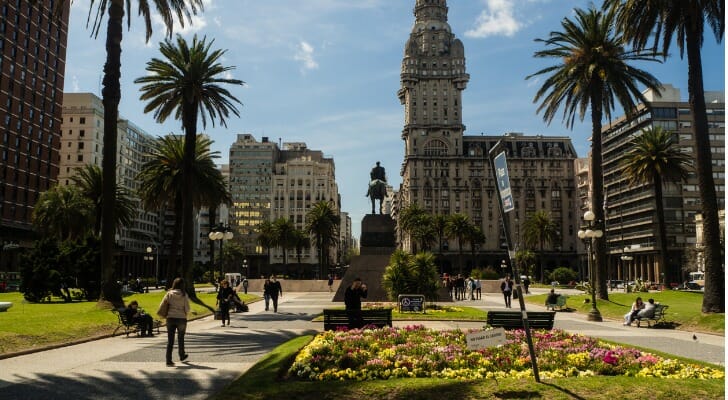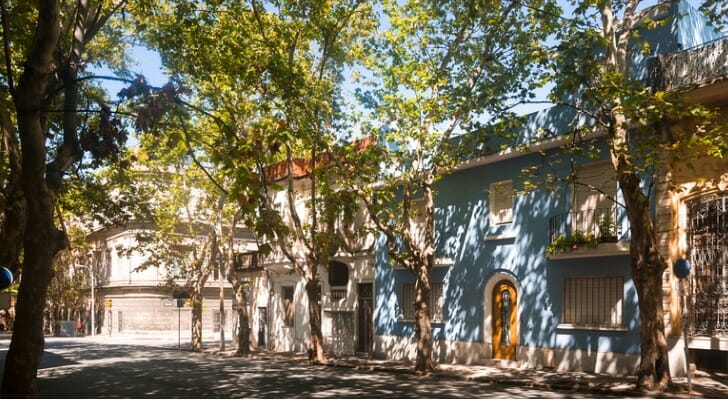How to Retire in Uruguay: Costs, Visas and More
Uruguay has become a popular retirement destination due to its warm climate and affordable living. This South American country is located between Argentina and Brazil and is known for its friendly citizens and rich...Tuesday, March 3rd 2020, 11:11 am
By Ashley Chorpenning
 Uruguay has become a popular retirement destination due to its warm climate and affordable living. This South American country is located between Argentina and Brazil and is known for its friendly citizens and rich culture. Not surprisingly, it’s a global favorite for retirees. If retiring in Uruguay piques your curiosity, there are some details you’ll want to know first, from the cost of living to healthcare to immigration laws.
Uruguay has become a popular retirement destination due to its warm climate and affordable living. This South American country is located between Argentina and Brazil and is known for its friendly citizens and rich culture. Not surprisingly, it’s a global favorite for retirees. If retiring in Uruguay piques your curiosity, there are some details you’ll want to know first, from the cost of living to healthcare to immigration laws.
It’s no wonder that retirees flock to Uruguay. This vibrant country offers a stable economy, mild climate, safe drinking water, affordable healthcare, beautiful beaches, minimal taxes, and little crime. While Uruguay isn’t the cheapest South American country, expenses do tend to be quite a bit less than what you would see living in the United States. According to Numbeo.com, a website that collects pricing data from citizens, the cost of living in Uruguay is 27.95% lower than the United States.
While the cost of living will depend on your lifestyle and exact location, you should probably plan a monthly budget of about $3,000. Quality housing can be very affordable for retirees in Uruguay. According to data collected by Numbeo.com, the national average of a one-bedroom apartment costs $450 for a place in a city and $343 on average for a place in the suburbs. If you want a little more space or you want extra rooms for when your family visits, the national average cost for a three-bedroom apartment in the city center runs about $770 per month and $610 in the suburbs. For basic utilities such as electricity, heating, cooling, water, garbage, internet, and transportation you can expect to pay roughly $315 per month.
Of course, your housing cost will vary depending on what city you choose to live in. For instance, Montevideo was ranked the most expensive city in Latin America in 2019 according to Mercer’s 25th Annual Cost of Living Survey. However, if you’re looking for a less expensive community, you may want to try Uruguay’s countryside towns like Mercedes or Atlántida.
Healthcare in UruguayMany retirees seek low-cost healthcare plans. Fortunately, Uruguay has a robust healthcare system that has no restrictions and offers healthcare and quality medical treatment to everyone that resides in the country. What makes Uruguay stand out is its private hospital membership plan known as mutualista. After the membership is accepted, the hospital offers members healthcare ranging from doctors’ visits to emergency room care. The monthly membership fee for this plan is often less than $100 and a small co-pay when you visit a doctor.
It’s important to note that Uruguay is not a medical tourist destination. This means that if you’re traveling to Uruguay and need medical attention it may be quite expensive. However, for expats and locals, long-term healthcare plans can offer security and value.
Visa LawsThere are a couple of options for visas in Uruguay. The most popular is a retirement visa. This will allow you to bring your vehicle with you without paying taxes and will get you an Uruguayan passport. This visa has no income requirement but is time-consuming to obtain.
When applying for residency and a visa, you must go to immigration. A permanent residency application can take months or years to process – some people report the process taking up to two years. Fortunately, you do not need a permanent resident visa or passport to begin living in Uruguay full-time.
After five years of full-time residency, you can apply for citizenship. To gain citizenship, you must be able to prove that you spend most of your time in Uruguay and intend to continue living there. You may maintain your American citizenship and hold two passports if you wish.
Housing in UruguayPurchasing property in Uruguay is straight-forward. The national average costs for a one-bedroom apartment in Uruguay is $223 per square foot in a city center and $170 per square foot outside of the center of a city. In Montevideo, the nation’s most expensive city, this average increases. But it is still less expensive than New York City where an average apartment cost about $1,373 per square foot.
Uruguay is known for being one of the most stable places in South America to purchase a home. In the past decade, an increasing percentage of Americans and Europeans have been buying properties in Uruguay.
Housing Process in UruguayNatives and non-Uruguayan citizens are treated the same when it comes to purchasing properties in Uruguay. However, you must use a public notary to prepare any legal documents and to advise that all documents are in order. For example, they will advise on if there are outstanding debts on the property or anything else that would prevent you from purchasing the home.
As you look for areas to live in, remember that Uruguay experiences all four seasons. Additionally, some areas are more attractive to expats than others. As you research areas, be sure to enlist the help of a lawyer, notary, and real estate agent for future assistance.
Once you have found a property that you want to pursue, the formal home-buying process begins with a boleto de reserva or a reservation contract. The buyer and seller will each review the contract and sign it in the presence of the notary. At this time, a deposit will be required. This deposit is easily compared to a down payment in the United States. This is typically between 10-20% of the selling price of the property, and the lawyer will hold the payment until the transaction is complete.
Then, the notary gathers all the documents necessary for the transfer of ownership. This includes the title, tax receipts, and any statements of debt on the property. They will also research the history of the property going back at least 30 years. This ensures that there are no legal issues with the property. Once this is finished, the buyer, seller, and anyone else involved in the sale of the property will meet with the notary to confirm all the documents are accurate.
The notary then has one month to write the new deed to the home, pay any taxes, and register the deed with the local government. Then, any payments are due, the documents are signed, and the buyer must purchase homeowner’s insurance.
Taxes in Uruguay Uruguay has a territorial tax system. This means that if you’re a resident of Uruguay you don’t need to report many types of income earned outside the country. This includes retirement pensions, Social Security payments, rental income, and capital gains. Because many other countries require residents to pay taxes on worldwide income, this is a plus for this destination. However, territorial taxation does apply to interest and dividend payments. So, if you’re a resident you will need to pay a flat 12% tax on earned income.
Uruguay has a territorial tax system. This means that if you’re a resident of Uruguay you don’t need to report many types of income earned outside the country. This includes retirement pensions, Social Security payments, rental income, and capital gains. Because many other countries require residents to pay taxes on worldwide income, this is a plus for this destination. However, territorial taxation does apply to interest and dividend payments. So, if you’re a resident you will need to pay a flat 12% tax on earned income.
This rule was designed to discourage Uruguayans from keeping savings outside of the country. If you paid 12% in taxes to a jurisdiction outside Uruguay then you may not have to pay taxes in Uruguay. If you paid less, you would simply pay the difference. Therefore, for many retirees this tax has little impact on them. For those who earn an income in Uruguay, you’ll receive an income tax which is known as impuesto a la renta para personas físicas (IRPF). This tax applies to income over $700 per month (accounting for the current exchange rate) and can range between 10% and 36%.
You’ll still need to file a U.S. tax return as an expat. This is true even if you don’t end up having to pay any U.S. taxes. It’s unlikely you’ll have much income originating from outside the U.S. in retirement. These include the foreign earned income exclusion, the foreign tax credit and the foreign housing exclusion, among others. If you’d like to forecast your tax burden more specifically, you may want to consult with a tax expert who is familiar with both U.S. and Uruguayan tax laws.
The TakeawayWith a mild climate, vibrant culture, and striking landscapes, it makes sense why you would want to retire in Uruguay. Additionally, the friendly locals and low crime rates make it a very attractive place to spend your golden years.
Tips for Saving for Retirement- Consider talking to a financial advisor about about whether you’re financially prepared to retire outside the United States. Finding the right financial advisor who fits your needs doesn’t have to be hard. SmartAsset’s free tool matches you with financial advisors in your area in five minutes. If you’re ready to be matched with local advisors who will help you achieve your financial goals, get started now.
- There are many different ways to save for retirement. You’ll most likely need to supplement the income you receive from Social Security; the most popular vehicles are IRAs and 401(k) plans. Whatever you do, start early so you can take advantage of compound interest. Use our retirement calculator to see if you’re on pace to meet your retirement income needs.
Photo credit: ©iStock.com/Erlantz Pérez Rodríguez, ©iStock.com/RicardoKuhl, ©iStock.com/JackF
The post How to Retire in Uruguay: Costs, Visas and More appeared first on SmartAsset Blog.
Information contained on this page is provided by an independent third-party content provider. Frankly and this Site make no warranties or representations in connection therewith. If you are affiliated with this page and would like it removed please contact pressreleases@franklymedia.com
More Like This
March 3rd, 2020
December 14th, 2024
December 14th, 2024
December 14th, 2024
Top Headlines
December 14th, 2024
December 14th, 2024
December 14th, 2024
December 14th, 2024







